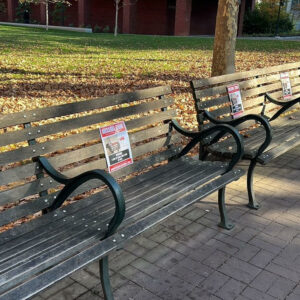At a recent congressional hearing on antisemitism at elite U.S. colleges, terrorism expert Dr. Jonathan Schanzer called the University of Pennsylvania “probably the worst campus I’ve seen.”
In response to questions from U.S. Rep. Brian Fitzpatrick (R-Bucks), Schanzer said, “It is embarrassing to me, as a son of Philadelphia and as a Jew, to see this happening. It is unbelievable that it’s happening in America, for that matter.”
And now the U.S. Department of Education Office of Civil Rights (OCR) is opening an investigation into the University of Pennsylvania’s handling of antisemitic and Islamophobic occurrences on its campus.
Jewish organizations were worried by UPenn’s decision to welcome the Palestine Writes Festival just before Yom Kippur and near a building where Jewish students were going to pray. Among the speakers at the Palestine Writes Festival was noted antisemite Roger Waters of Pink Floyd fame.
The Hillel building was then vandalized by a person yelling antisemitic slurs.
In the wake of the Oct. 7 attack on Israel by Hamas terrorists, the situation has gotten worse, Schanzer said.
“You have a speaker at Penn against the occupation, a rally praising Hamas for a job well done on 10/7. We have at Penn’s AEPi house, someone scribbled the message ‘Jews are Nazis.’ The Hillel was broken into. The Chabad was vandalized. A swastika was drawn on an academic building. We’re watching protests where they’re calling for Palestine from the river to the sea. This is calling for the destruction of the State of Israel. They’re calling for an intifada, a violent uprising. There’s a vigil and a walkout to honor the Palestinian martyrs, those who are killed fighting against Israel. And then, finally, a faculty Senate statement was published that was really, I think, the end message was that the university should not cave to Jewish donors who are demanding change. This is unbelievable that it’s taking place at Penn. It’s unbelievable that it’s taking place in America, and it’s just a microcosm of what we’re watching across the country.”
Several prominent donors withdrew their funding from the university, and alumni wrote letters protesting the university’s lack of action to stop the antisemitic hate speech.
On Nov. 1, Penn President Liz Magill announced a task force to work on the problem, with increased security and education. She said steps would be taken to stop antisemitism.
On Nov. 8, holographic images with antisemitic slurs were projected on Penn buildings. Last week, signs appeared on benches around the Penn campus, similar to the signs with Israeli hostages, except the pictures were of cows.
Steve Silverman, a spokesman for Penn, sent this statement: “We have received the letter from the Department of Education and look forward to cooperating fully with the department. The university is taking clear and comprehensive action to prevent, address, and respond to antisemitism, with an action plan anchored in the National Strategy to Counter Antisemitism. President Magill has made clear antisemitism is vile and pernicious and has no place at Penn; the university will continue to vigilantly combat antisemitism and all forms of hate.”
Penn is one of several universities around the country that the OCR is investigating for antisemitism, including Cornell University and Columbia University, after receiving complaints about alleged incidents of antisemitism and Islamophobia.
The investigations include five antisemitism cases and two Islamophobia cases.

